![]()
HeelBoyHeel is reader supported. When you buy through any link on our site, we may earn an affiliate commission, but never at any extra cost to you.
So your beautiful dog comes running up to greet you in the morning, full of love and licks and kisses… but that breath!
When the family dog has bad breath, it can be an unpleasant experience for everyone. Suddenly, no one in the family wants to get too close to the dog, and everyone is shooing him away without giving him any attention at all.
So if you’re wondering why does my dog’s breath smell so bad, and what can I do about it… read on.
Figuring Out the Cause of Bad Breath in Your Dog
The first thing you have to do to handle bad breath in your dog is to figure out what is causing it. After all, the strategy that you use to get rid of bad breath is totally dependent on whatever is causing it in the first place.
If you can figure out why your dog’s mouth smells like a cesspool, then you will be able to come up with the right remedy.
Bad breath (medically known as halitosis) in dogs is caused by any one of a number of issues, including:
- Organ disease (liver and/or kidney)
- Poor diet (spoiled table scraps)
- Poor dental care (Dental or Gum Disease and plaque buildup)
- Tooth decay (rotting teeth)
- Coprophagia (eating of feces)
In order to find the cause, you’ll need to do a bit of sleuthing.
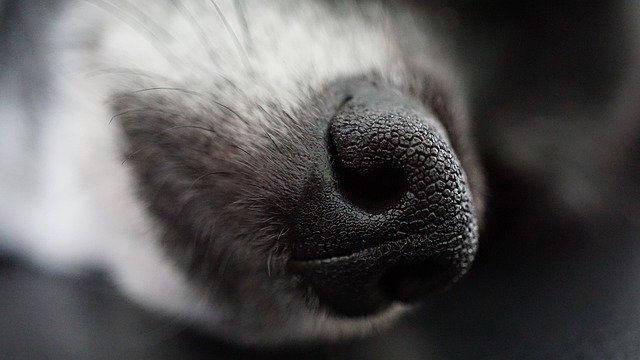
Bad Dog Breath Cause 1: Organ Disease
Although it is the most unlikely, the first thing to rule out is a health issue.
If your dog suddenly develops bad breath, it’s important to figure out why before you attempt to get rid of it by giving your dog a few “fresh-breath treats.” Watch your dog as closely as possible to see if he is exhibiting any behavioral issues that might indicate he is sick.
Metabolic diseases like kidney failure can directly cause bad breath, often making the dog’s breath smell like ammonia. Diabetes can also affect a dog’s breath, giving it a sweet, fruity smell.
Some of the reasons behind dog halitosis might be difficult to determine on your own, so if you are unsure why your pet suddenly has bad breath, you might want to take him to a veterinarian for a full physical, just to be on the safe side.
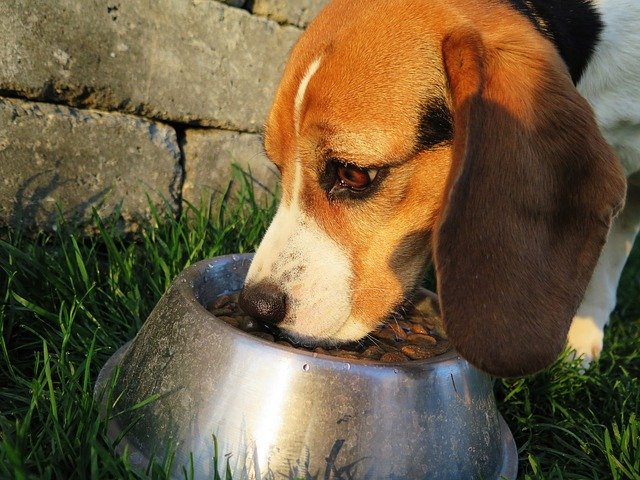
Bad Dog Breath Cause 2: Poor Diet
Naturally, the type of dog food you feed your dog will directly affect his breath. Think about his diet, maybe keep a diary of what he eats in a typical day – including all the in between meals snacks.
Some food will have a very strong bad affect on certain dog’s breath – each dog is different, so you may need to try out different feeds, especially if your dog has a sensitive stomach.
Particularly think about whether or not anyone in the family is feeding your pet table scraps – this should be avoided.
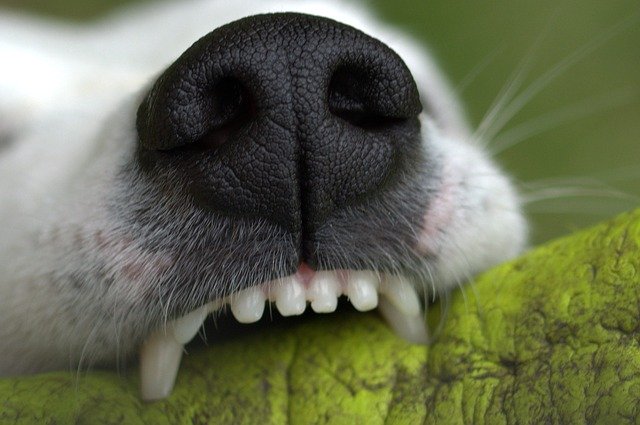
Bad Dog Breath Cause 3: Teeth
Dental health is as important in dogs as it is in humans.
Take a thorough look at your dog’s teeth. Search for plaque buildup, cracks, chips, and discoloration. In most cases this can be remedied by brushing your dog’s teeth.
But bad breath in dogs can also be caused when your dog has a dental condition – like gum disease or infection, plaque build up, or tooth decay. In these cases, professional dental care may be required.
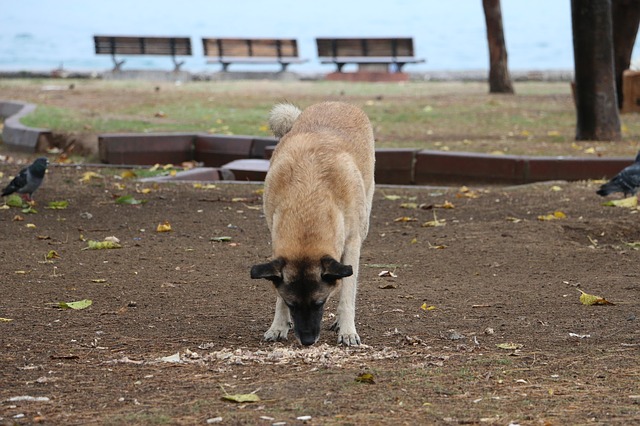
Bad Dog Breath Cause 4: Eating Feces
Observe your pet when you take him for walks to see if he is eating animal feces. This can be difficult to stop, but the first step is to identify if it is a problem that needs solved.
If it is, you’ll need to take some preventative measures – we’ll come back to that below.
How To Treat Bad Breath in Your Dog
The treatment for your dog’s bad breath will of course depend on the cause.
When the cause of your dog’s bad breath is related to his diet, you might have to incorporate a few changes.
A dog’s diet shouldn’t contain any table scraps, so you should avoid feeding your pet food which was intended for people. Dogs should not be fed scraps. Even though those pleading puppy dog eyes can be very persuasive, be strong! Human food is for humans, not for dogs, and is often not good for dogs – or for their breath.
If the cause of your dog’s halitosis is related to his teeth, a vet can handle these issues for you. Once your pet’s teeth have been cleaned and/or repaired, you’ll want to make sure that you take steps to keep your doggie’s teeth clean using special dog chew treats or brushing.
Dental chews can really help allievate bad dog breath. Look for the ones that contain chlorophyll, cinnamon and clove. These might make your dog’s poo a little green, but don’t worry about that, it’s perfectly natural, and the chlorophyll will wonders for smelly dog breath.
What if the cause of your dog’s bad breath is eating feces?
Unfortunately, if your pet enjoys eating the feces of other animals, you might find it difficult to get him to stop.
This is very common, and can be a difficult habit to break, but like any dog training, consistency is key. Use distraction techniques when you catch him in the act, and reward him when he leaves the poo and comes to you.
Be very particular about cleaning up any feces from your yard, and if there are particular places where your dog often finds his ‘favorite’ feces, then try to avoid try to avoid walking him in these places.
Conclusion
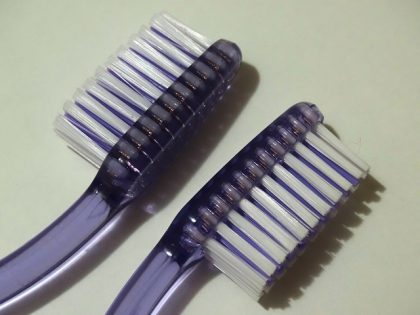
Provided there are no underlying health issues, the best thing you can do to improve your dog’s breath is to brush his teeth every day.
Because the bacteria grow constantly, it really does need to be every day. Just as with us humans, brushing your dog’s teeth removes soft plaque before it hardens into calculus which is much more difficult to remove.
Rather than just jumping straight in with a dog toothbrush, you might want to start working up to a full brushing by using gauze instead. Just wrap it around your finger and gently but firmly run it over your dog’s teeth. Remember, never use human toothpaste as it often will contain xylitol, which can cause liver failure in dogs. Use specially formulated dog toothpaste instead.
If you need some help getting started brushing your dog’s teeth, the video below should help
While most people associate bad breath with people, it is also very common in dogs.
If your doggie has halitosis, do take the time to figure out why so you can help him to freshen up his mouth. It means you will have a happy, healthy dog – no no-one will be running for covers when those doggy kisses come!